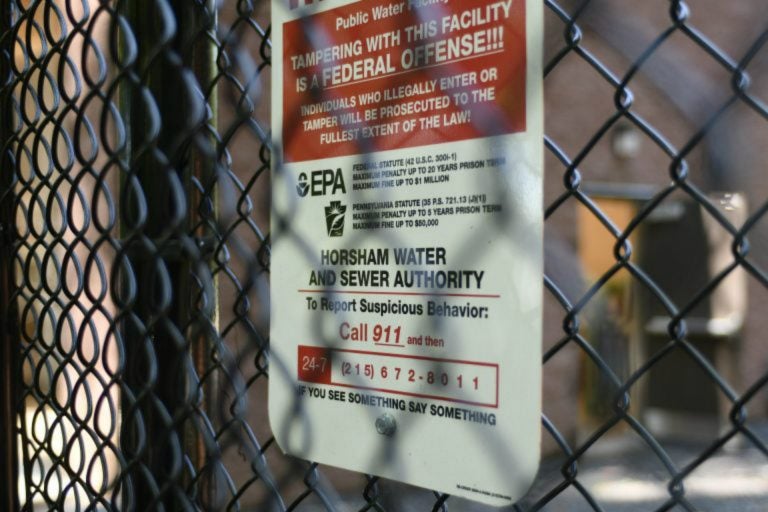Toxic PFAS chemicals, found across Pennsylvania, get the Hollywood treatment
Dark Waters dramatizes the true story of a former corporate lawyer who exposed the effects of toxic PFAS chemicals discharged into a creek in West Virginia.

Detailed view on the newly installed system to filter out PFAS Forever Chemicals at Well #2 of the Horsham Water and Sewer Authority facility in Horsham, Pa., on August 22, 2019. (Bastiaan Slabbers for WHYY)
This article appeared on StateImpact Pennsylvania.
—
Authorities and homeowners are finding high levels of PFAS, toxic chemicals linked to cancer and other health problems, in drinking water across Pennsylvania.
That includes samples taken around former military sites at Harrisburg International Airport and the U.S. Navy facility in Hampden Township, where the likely source was firefighting foam.
Despite mounting research showing significant health risks, the chemicals are not routinely tested by drinking water systems or formally regulated by the U.S. Environmental Protection Agency.
Now, the issue has garnered the attention of Hollywood.
Dark Waters, which will gradually roll out to theaters starting Friday, dramatizes the true story of Rob Bilott, a former corporate lawyer who exposed the effects of toxic PFAS chemicals discharged into a creek in West Virginia. On Tuesday, Bilott and several other PFAS experts joined Mark Ruffalo, the actor who plays Bilott, in testifying before Congressional subcommittee tasked with mulling new PFAS regulations.
Earlier this year, the EPA announced a plan that will eventually lead to draft regulations but the agency has drawn criticism for the pace of its rollout. The events covered in Dark Waters began 18 years ago.
“We have the science,” Ruffalo said, in his testimony Tuesday. “We did the studies. We know. We can’t sit here and pretend this didn’t happen.”
Ruffalo has engaged in environmental and public health activism for years. For example, he repeatedly visited Harrisburg to advocate for stricter fracking regulations.
The EPA set a 70 parts per trillion limit for PFAS chemicals in drinking water. But that’s a health advisory, not a regulation that can be enforced, and recent research indicates that far smaller concentrations can be dangerous.

A York County homeowner who took it upon himself to test his drinking water found a combined level of 186 parts per trillion.
First developed by 3M in the 1930s and mass-marketed in the ‘40s and ‘50s, these synthetic chemicals—also known as perflourinated chemicals or PFCs—enabled the development of nonstick cookware, water-repellent clothing and firefighting foam. Today, there are thousands of these chemicals known by acronyms like PFOS, PFOA, PFNA and PFHxS.
But the chemical bonds that give PFAS their heat, oil and water-resistant qualities are so resilient they don’t break down in the environment — or in the human body. It didn’t take long for PFAS to make their way into drinking water and, finally, the human bloodstream. They’ve been linked to various health effects, including pregnancy complications and problems related to the liver, lungs and thyroid.
Gov. Tom Wolf, in the absence of federal action, announced a plan earlier this year to begin testing drinking water for the chemicals.
In addition to their testimony before Congress, Bilott and Ruffalo, launched a new website, FightForeverChemicals.com, to promote the film and rally support for federal PFAS regulation.
“The regulatory process, the scientific process, the political process — all of that drags on,” said Bilott, in his testimony.
PennLive and The Patriot-News are partners with PA Post. PA Post is a digital-first, citizen-focused news organization that connects Pennsylvanians with accountability and deep-dive reporting.
WHYY is your source for fact-based, in-depth journalism and information. As a nonprofit organization, we rely on financial support from readers like you. Please give today.




